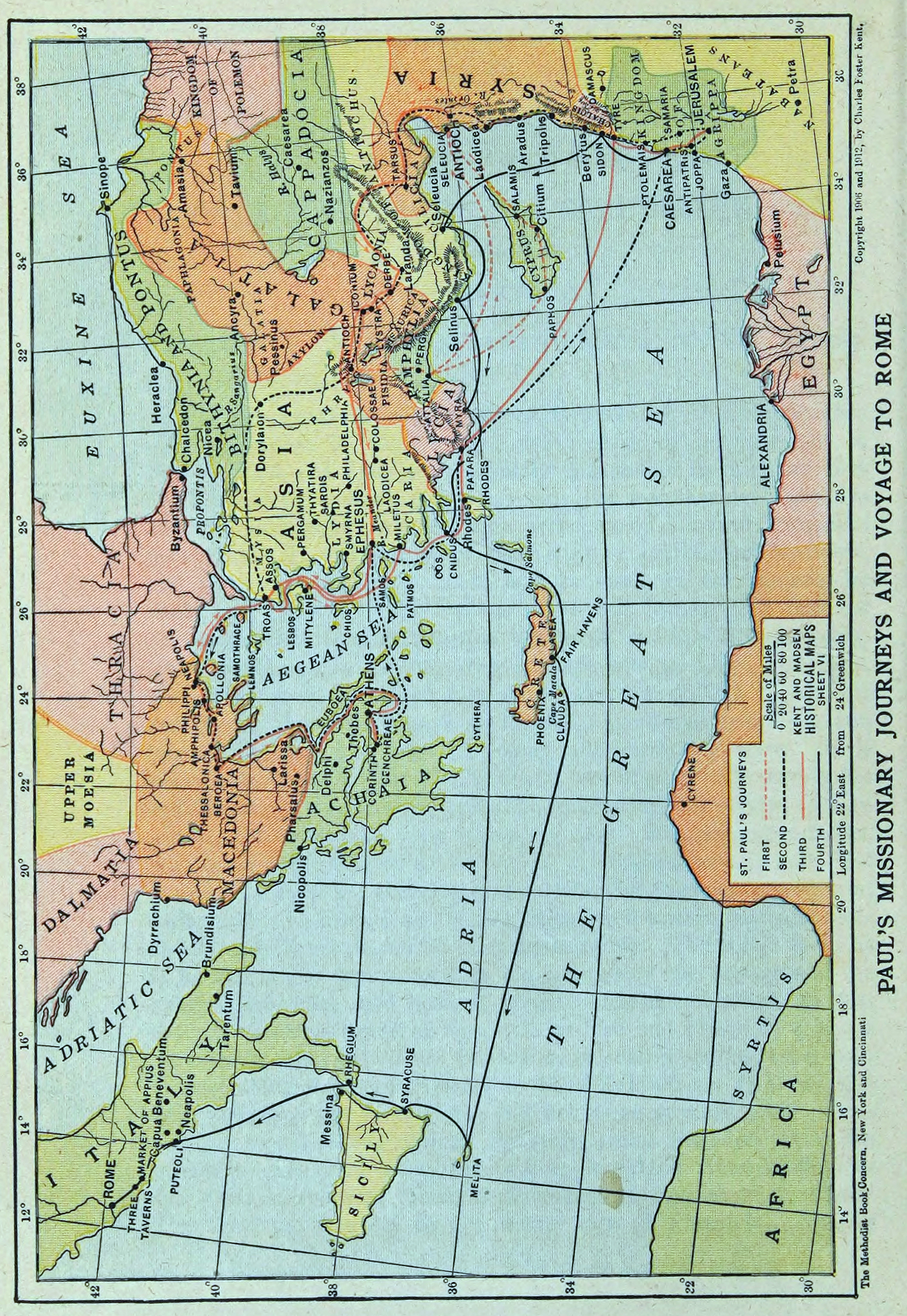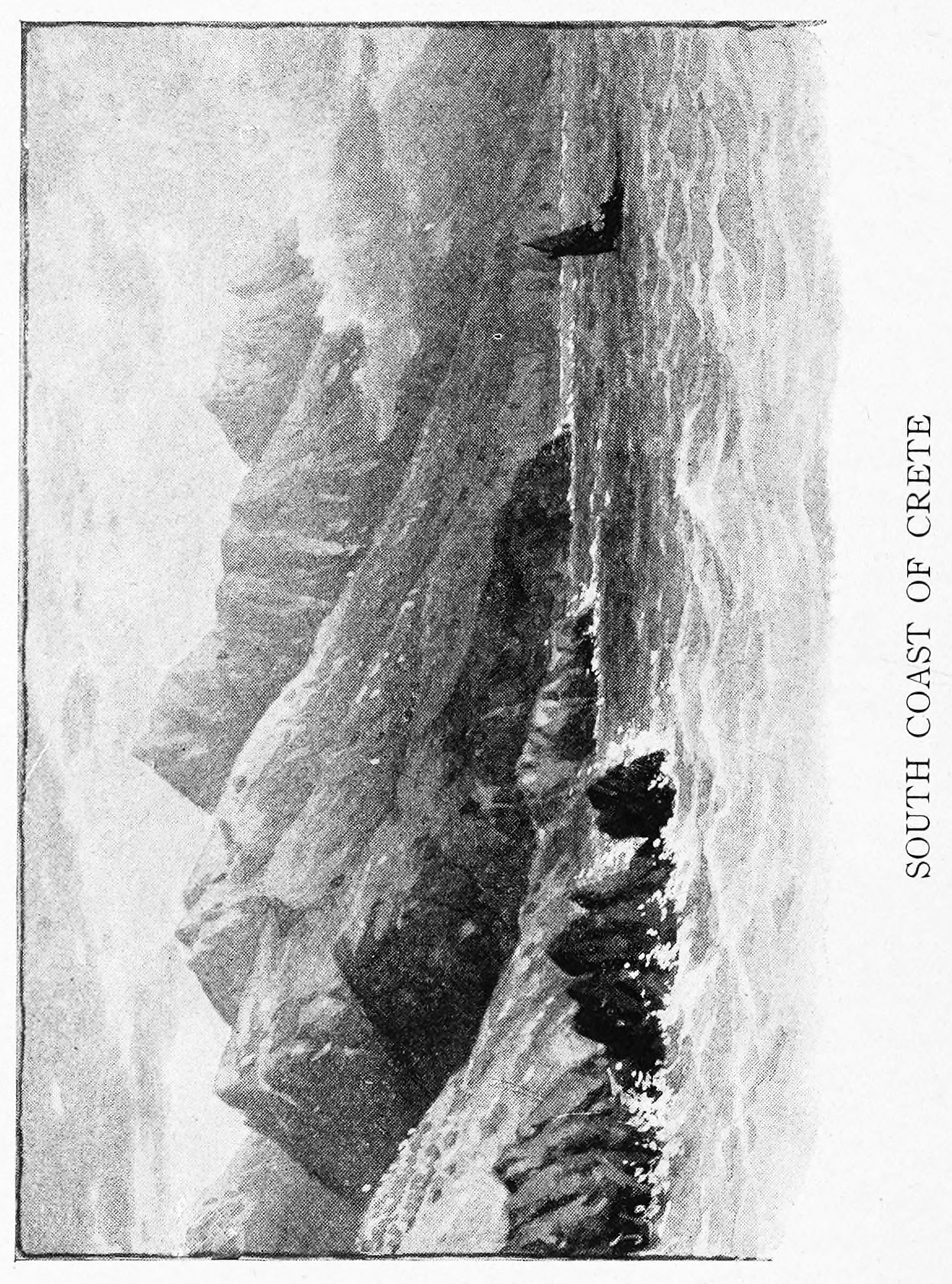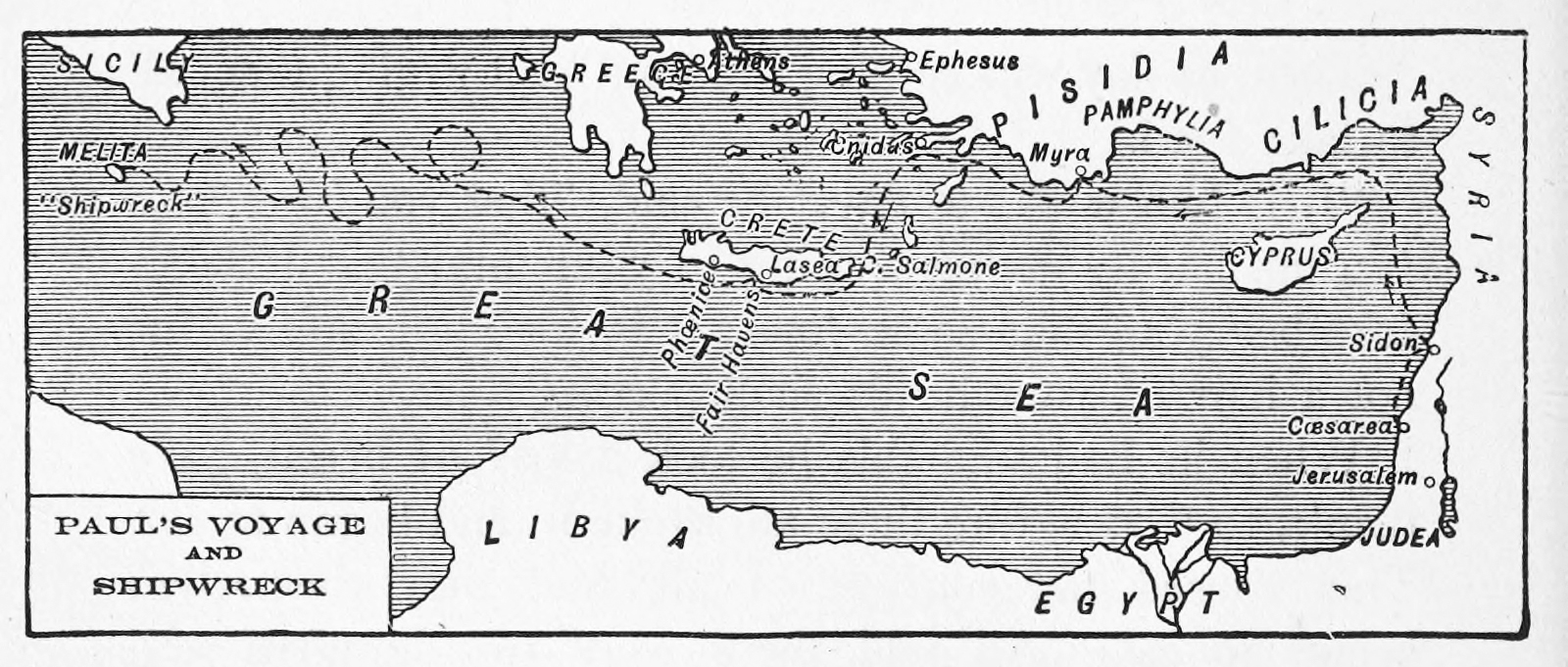Paul’s Voyage and Shipwreck
on Malta
|
Translation
|
|
Commentary |
|
Paragraph 1. FROM CĂSAREA TO MYRA IN ASIA MINOR. Verses
1-5. |
|
Now, as it was decided that we
should sail for Italy, Paul,
along with some other prisoners,
was put in charge of a Captain
of the Augustan regiment named
Julius. So embarking on a ship
of Adramyttium, bound for the
ports of the Province Asia, we
put to sea, a Macedonian,
Aristarchus from Thessalonica,
being with us. On the next day
we put into Sidon, where Julius
treated Paul very kindly,
allowing him to visit his
friends and accept their
hospitality. Thence, putting to
sea again, we made our course to
the leeward of Cyprus, because
of the unfavorable winds, and
when we had sailed across the
gulf lying off Cilicia and
Pamphylia, we arrived at Myra in
Lycia.
|
|
Over two years have been passed in CŠsarea. Of course they were not spent in vain waiting for release or advancement to Rome. Paul and Luke were actually engaged in learning all they could about and assisting in every way the neighboring Christians and any synagogues where Philip preached or his four daughters prophesied. It was not more than a day’s journey to Nazareth, and Luke no doubt went there and gathered all the material he could find relative to the Saviour’s life and family. He had not yet written his Gospel, but was beginning, even if unconsciously, preparations for it. It was easy in two days to reach Jerusalem, and here too Luke would find much of interest both to himself and Paul. Thus with intense application to reading, meditation, and prayer the time had been pleasantly and profitably spent. It is reasonable to think that Paul’s health had not suffered during his imprisonment. Festus arranges to send Paul to Rome before winter, but he actually puts to sea too late. The centurion Julius, with other prisoners from the Levant, is planning to sail, and Paul is turned over to his charge, together with the documents necessary, Luke and Aristarchus of Thessalonica, well-known acquaintances and friends, being permitted to accompany him. This again looks as if he had ample means, as does his bearing on the voyage and the evident deference paid him on several occasions, besides the fact that on reaching Rome he was able to hire and reside in a house of considerable size. They embark on a coaster sailing from port to port along the entire Levant to the Dardanelles. It is thought very plausibly that in case they did not come at some point across a larger vessel sailing directly for Italy, Julius intended taking his prisoners—for there were some others—overland from Philippi to the Adriatic, crossing thence to Brundusium, and so on to Rome. The first stop was old Sidon, mother city of
Phoenicia. Already
Paul has favorably impressed the centurion, and he is permitted shore leave while the cargo is attended to. Of course the Christian disciples profit greatly by his few hours ashore, and again we find a church which we had not known anything about. The next port is Myra, after beating up along the north coast of Cyprus and crossing the gulf to the mainland.
|

PAUL'S MISSIONARY JOURNEYS
AND VOYAGE TO ROME |
Translation
|
|
Commentary |
|
Paragraph 2. FROM MYRA TO FAIR HAVENS IN CRETE. Verses 6-12.
|
|
There Julius, finding an Alexandrian ship sailing for Italy, put us on board her. For a number of days we beat slowly to windward, and it was only with great difficulty we arrived off Cnidus, and, the wind being still unfavorable, we ran under the lee of Crete, rounding Cape Salmone, and, coasting along with difficulty, we arrived
at a place called Fair Havens not far from which was the city of Lasaea.
By this time the season was well advanced and navigation had become dangerous, for the Fast was already over. Therefore Paul began to warn them.
“Men,” he said, “I see that our voyage is going to be made with damage and much loss, not alone of the cargo and the ship but even of our own lives.”
Julius, however, gave more attention to the sailing master and the owner of the ship than to anything Paul said. Moreover, as the harbor was not adapted for wintering in, the majority were in favor of putting out to sea in the hope of reaching
Phoenix to winter there.
|
|
The centurion in charge finds in the harbor of Myra one of the great grain ships which was unusually late proceeding at once to Italy, and decides to transship his prisoners and take them on that way, hoping it would prove easier for him and much cheaper. They beat up the coast westward under lee of the highlands as far as Cnidus, on the last promontory of Asia Minor, and then ran down across the wind to Crete, and so again hugging the shore to Fair Havens, near the old city of Lasaea, midway of the south coast of the island. The north and northwesterly winds had blown steadily now for weeks and it was probably the middle of October; the Day of Atonement falling that year on the fifth of that month. It would seem from the record that Paul took the initiative here and advised Julius not to proceed farther. The centurion appears to have called the captain and sailing master also into conference and to have decided as the superior over them all the course of action. He wanted a comfortable table and place of entertainment for the winter and then a good harbor for the ship, and as
Phoenix lay only forty miles further and had these advantages, the decision was to watch for a shift of the wind, however slight, round Cape Matala and make the distance of that short run by sheer seamanship. Paul was not inexperienced in those waters, and to this was added another sense which made his advice better than that which prevailed. He, however, was not presuming to press his convictions unduly at this time, and decided to await developments—his Pilot, in any case, was also on board.
|
Translation
|
|
Commentary |
|
Paragraph 3. ACCOUNT OF THE FOURTEEN-DAY HURRICANE. Verses 13-20.
|
|
Phoenix is a harbor of Crete, looking northeast and southeast. So when a moderate southerly breeze sprang up, thinking they had gained their object, they weighed anchor and began to sail along the coast of Crete close inshore.
Before long, however, a terrific gale called Euraquilo (northeaster) struck down upon us from the land. The ship was carried out of her course and could not keep her head up to the wind, so we had to let her fall off and drive before it. Then, running under the lee of a little island named Cauda, with great difficulty we got the boat alongside, and after they had hoisted it’ on board they frapped the ship with supporting cables. Moreover, as they were afraid of being driven on the Syrtis quicksands, they shortened sail and lay to, drifting. The next day, as we were being violently tossed about, they began to throw the cargo overboard and the day following they threw over the ship’s spare gear with their own hands. Now, when neither sun nor stars had been seen for many days, and the gale continued unabated, all hope of our being saved was finally taken away.
|
|
The soft breeze which lured them out of their haven is but the precursor to an early winter hurricane. So suddenly burst the
gale that they could not bring on board the tender nor furl the mainsail, but simply ran before the wind in its first fury, twenty-three miles to the lee of an islet lying in their course named Cauda. Here, under its cover for a little while, they managed to get in the boat and shorten sail quickly and prepare as best they could for the desperate drive which they must make again as soon as they get out to sea. Among the operations necessary was that of “frapping,” for the seams had already begun to open. They skillfully slipped cables over the bow, allowing them to drift astern along the keel, then drawing them taut, kept the planks from working, and the ship finally foundering. As the gale was from
the northeast, they were sure to drive on the African quicksands unless they carried considerable sail, and yet this endangered them only slightly less because of the strain on the mast. They therefore lowered every piece of gear that could be spared and lay to. Night shut down on them in possibly the most storm-tossed latitude of that treacherous sea. The Mediterranean under winter storms is terrible in the extreme. The first day out they begin to jettison the cargo, the second they throw overboard the spare gear and fittings of the ship. They begin to lose appetite and all hope. The seamen lose all reckoning, for day is almost as dark as night, and the nights have no stars. They look for death, and death seems looking for them.
|

SOUTH COAST OF CRETE |
Translation
|
|
Commentary |
|
Paragraph 4. PAUL’S ADDRESS TO THE SHIP’S COMPANY. Verses 21-26.
|
|
Then after they had gone for a long time without food, Paul stood up among them and said:
“Alas, men, you should have listened to me and not sailed away from Crete and thus incurred this damage and loss. But now, I bid you to take courage, for there shall not be a single life lost among you, but the ship only. For there stood by me last night an angel of the God whose I am and whom I serve, saying, ‘Have no fear, Paul; you must appear before Cesar, and as a mark of His favor to you, God has granted the lives of all sailing with you.’ Therefore, men, take courage, for I believe God and I am confident that it will turn out exactly as I have been told, but we must be cast upon some island.”
|
|
Paul and Aristarchus and Luke had meanwhile spent much time in prayer. They could not easily converse nor read, they could do nothing with their hands since they assisted at heaving the heaviest spars over the side, but they could pray, and now they could sing. They had had a quiet, deep assurance that somehow they should not perish, but now they knew that the large passenger list and the soldiers and the crew would escape. For these they had worked as best they could since leaving Myra, more than a month back, and had prayed unceasingly, and now the answer had come. Paul has seen another vision. Jehovah’s angel has “stood by” his servant, and there need be no fear. He is to be saved to stand before Cesar, and God grants his prayer for his shipmates. The morning following this Paul begins the day by gathering all he can amidships and telling the story. He cheers them up and calls for new hope and courage. They shall all be saved, though the ship be wrecked. They shall be cast on an island. The word spreads from lip to lip, and even the centurion and the ship’s officers hear of it and discuss it for hours. To them he says that heed should have been given his warning at Fair Havens and thus the ship and cargo spared. It must be remembered that Paul had already suffered three experiences of shipwreck, and could refer to them as giving him some standing in. the premises even apart from his vision. What he then foretold has taken place, and he is even more sure of the outcome now promised. All this confidence, however, comes, he assures them, from the faith for which he is a prisoner on that
ship. He talks on now, for he has compelled attention. The storm is running out and there is nothing for the seamen to do but wait. He preaches Jesus and the new Way. He wins believers, as he has always done when he can get a hearing.
|
Translation
|
|
Commentary |
|
Paragraph 5. DESPERATE MEASURES AS THEY APPROACH LAND. Verses 27-32.
|
|
Now, the fourteenth night had arrived and we were drifting about in the sea of Adria, when about midnight the sailors began to suspect that we were nearing land, so they sounded, found twenty fathoms, and after a little they sounded again and found fifteen fathoms. Then, fearing that we might be wrecked on the rocks, they let go four anchors from the stern and kept longing for daylight. The sailors, however, began to try to escape from the ship, and had lowered the boat on pretext of carrying out anchors from the bow. But Paul said to the centurion and the soldiers, “Unless these men stay by the ship you cannot be saved.”
Then the soldiers cut away the ropes of the boat and let her fall off.
|
|
Adria was a name given in Paul’s day to the waters lying south of the modern Adriatic, and Luke speaks of it thus in the record, written later, because they found themselves there when day broke. It is the night following Paul’s announcement that they should be wrecked on an island. The sailors are huddled before the mast. They are keenly alert. The wind has dropped, though the sea runs high. Suddenly the boatswain calls for the lead. He is sure he has a whiff of a land breeze. He pays out the line to twenty fathoms. They are nearing some shore. In a few minutes he heaves it again and sounds fifteen fathoms. They are close in. They hear the breakers now, and some can see in the distance the gleam of white foam. The captain orders four anchors, one after another, out of the stern. They must not be driven upon the rocks, at least before daylight. Some desperate characters among the sailors, caring only for their own lives, and knowing that the boat would be at the command of the centurion and for the chief passengers, planned to get it over the side and escape to the shore. Their excuse is, when discovered, that the bow anchors could also be utilized if carried out to full cable’s length. Paul is on deck and hears the parley. He says to the centurion that all must stay by the ship or many will be lost. Paul’s word now is recognized as one of authority. Julius orders his soldiers to cut her adrift and the boat falls into the sea. Rather a desperate thing to do, seeing that they had no other tender, and indicating both Paul’s hold on the man and the sinister character of those in the plot. Paul sees that he has standing on the ship and at once assumes chief command.
|

PAUL'S GROTTO-MALTA |
Translation
|
|
Commentary |
|
Paragraph 6. PAUL TAKES COMMAND AND SAVES ALL ON BOARD. Verses 33-44.
|
|
Then, as day was coming on, Paul kept urging them all to take food.
“It is two weeks to-day,” he said, “that you have kept fasting, hardly eating a thing in your anxiety. I therefore beg you, take some food; it is for your safety, for not a hair of your heads shall perish.”
When he had
said this he took a loaf of
bread, gave thanks to God before
them all, broke it, and began to
eat. This roused the courage of
all, and they themselves began
to eat. All told there were two
hundred and seventy-six souls of
us on board. So when they had
taken their fill they began to
lighten the ship by throwing
out the wheat into the sea. When day began to break they could not recognize the land, but they made out an inlet with a sandy beach, on which they resolved to see if they could beach the ship. So they cut away the anchors and left them in the sea; at the same time they unlashed the steering oars, hoisted the foresail to the wind, and were making for the beach, but, striking a reef, they ran the ship aground and her bow stuck fast and could not be moved, while the stern began to break up under the pounding of the waves. Now, the soldiers formed a plan to kill the prisoners, lest any of them should swim off and escape. But the officer, wishing to save Paul, put a stop to this project and ordered those that could swim to throw themselves overboard first and get to land, while the rest should follow, some on planks and some on wreckage of the ship. In this way, it turned out that all got safely to shore.
|
|
Dawn now draws on. The coming day will tax every fiber of
their remaining strength. Paul asks for food; he tells Julius and
the officers to order it for everyone on board and goes about cheerily urging those who are indifferent and half sick to eat.
“Remember,” he says, “none of us is to be lost. Eat heartily; we are near the end of our voyage in this ship. Eat all you can.”
Then he goes a little apart with his comrades and a number of recent believers, breaks the loaf, gives thanks to God, and begins a hearty meal with the token of brotherly love, and they share the cup and loaf and the viands now freely brought out. The entire company catches the infection—two hundred and seventy-six souls as good as saved from the deep. Few ever forgot that meal, and we can believe that few ever forgot their friend, the citizen of no mean city. Now, Julius, convinced that the ship is doomed, orders the rest of the cargo thrown overboard, intending to beach her. When all is made ready they cut her loose, raise sail, and steer for an inlet with a sandy beach. They strike fast, however, on a hidden ledge, and the sea begins to break over the stern and smash it in. Confusion breaks out and the soldiers, without orders from Julius, plan to kill the prisoners. The centurion gets knowledge of it just in time to prevent any actual slaughter, orders all to be set free and save themselves, first those who are able to swim, and then, with various objects to keep them afloat, the rest, and thus, as Paul had predicted, all reach the shore in safety. The fine way in which Julius managed to protect Paul, as he thought, from death must not be overlooked.
|

PAUL'S VOYAGE AND SHIPWRECK |
|
|
|
|



 Home
Home What's New
What's New Bible
Bible Photos
Photos Hiking
Hiking E-Books
E-Books Genealogy
Genealogy Profile
Free Plug-ins You May Need
Profile
Free Plug-ins You May Need
 Get Java
Get Java.png) Get Flash
Get Flash Get 7-Zip
Get 7-Zip Get Acrobat Reader
Get Acrobat Reader Get TheWORD
Get TheWORD


